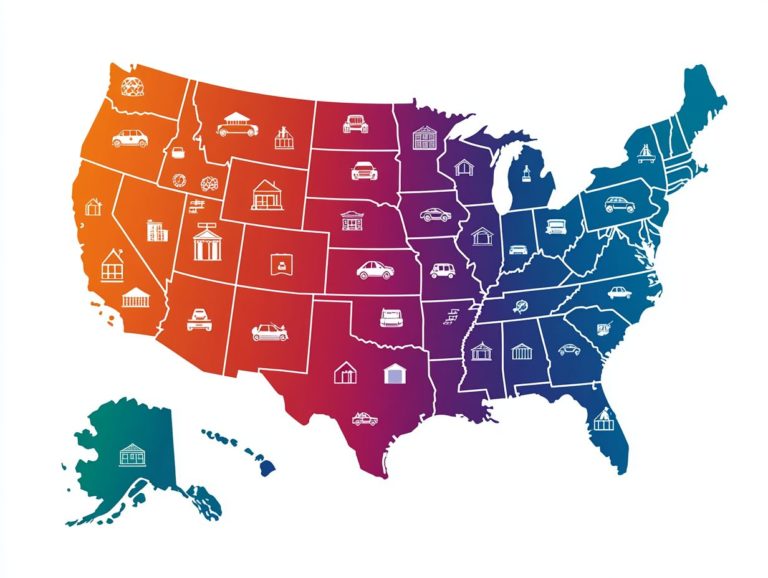Key Features to Look for in Auto Insurance Policies
Auto insurance is not merely a legal obligation; it acts as an important protection for both you and your vehicle.
With a range of coverage options and limits at your disposal, understanding the details of your policy can lead to significant savings and a sense of tranquility while driving.
This article delves into the fundamental aspects of auto insurance, outlining the various types of coverage available and the factors that influence rates. The article also uncovers strategies for discovering discounts and offers tips for selecting the ideal insurance company!
Contents
- Key Takeaways:
- Understanding Auto Insurance Policies
- Coverage Options and Limits
- Factors Affecting Auto Insurance Rates
- Discounts and Savings Opportunities
- Choosing the Right Auto Insurance Company
- Frequently Asked Questions
- What are the key features to look for in auto insurance policies?
- What is comprehensive coverage and why is it crucial?
- Why is liability coverage a crucial feature in auto insurance policies?
- What does collision coverage cover and why is it recommended?
- Why should I consider uninsured/underinsured motorist coverage?
- What is personal injury protection and why is it a beneficial feature in auto insurance policies?
Key Takeaways:

- Understand what auto insurance is and why it matters.
- Identify the right coverage types and limits to save money and protect yourself.
- Compare quotes from different insurers to find the best rates based on your driving record and vehicle type.
Understanding Auto Insurance Policies
Understanding auto insurance policies is crucial for you as a driver or vehicle owner! These policies serve as a vital financial shield against unexpected events like accidents and vehicle damage. To ensure you get the right coverage, it’s important to know what to look for in an auto policy.
In many states across the United States, auto insurance isn t just a good idea; it’s a legal requirement and a hallmark of responsible vehicle ownership. With a diverse range of coverage options available ranging from liability coverage (financial protection against injuries or damages you cause) to comprehensive coverage it’s imperative that you assess your unique needs.
Familiarizing yourself with the various types of insurance policies offered by different companies will empower you to make informed decisions about your coverage.
What is Auto Insurance and Why is it Important?
Auto insurance is essentially a contract between you and an insurance company designed to offer financial protection against losses stemming from vehicle-related incidents. This vital agreement not only safeguards you but also protects other road users, addressing a range of unforeseen circumstances that may arise.
Take liability coverage, for instance it s critical because it shields you from claims made by others for injuries or damages caused by your vehicle. Collision coverage, on the other hand, helps you repair or replace your car after an accident, no matter who s at fault.
By understanding these fundamental types of coverage, you can significantly enhance your peace of mind, especially when navigating the often intricate claims process. This understanding ensures that financial burdens are minimized during those challenging moments.
Coverage Options and Limits
Coverage options in auto insurance vary significantly, allowing you to tailor your policy to meet your unique needs. This customization ensures that you have the protection necessary to safeguard against the various risks that come with vehicle ownership.
Types of Coverage Available

There are various types of coverage available in auto insurance, each tailored to provide specific financial protection against a range of risks and incidents.
Liability coverage stands out as one of the most critical types, as it helps cover damages if you are found at fault in an accident. Then there s collision coverage, which steps in to assist with repairs or replacement of your vehicle after a crash, regardless of who s to blame. Comprehensive coverage takes it a step further, protecting you against non-collision-related incidents like theft or natural disasters.
It s vital to identify potential gaps in your coverage that could leave you exposed. Uninsured and underinsured motorist protection is particularly important; it ensures you re covered if you find yourself in an accident with someone who lacks sufficient insurance, offering you that extra layer of peace of mind.
Determining the Right Coverage Limits
Determining the right coverage limits is crucial for ensuring you have adequate financial protection while also meeting state mandates regarding auto insurance.
Several factors significantly influence these coverage limits, including your unique risk profile, which refers to your history as a driver and how likely you are to make a claim, the specific legal requirements set by your state, and your overall financial health. For instance, if you have a higher risk profile, perhaps due to a history of multiple driving incidents, you might require more extensive coverage to safeguard against potential losses. State laws often require minimum liability coverage, which can add another layer of complexity to the decision-making process.
Assessing your personal financial situation, including your assets and income, is essential when selecting appropriate coverage that not only provides peace of mind but also fulfills your legal obligations.
Factors Affecting Auto Insurance Rates
Numerous factors play an important role in determining auto insurance rates, making it crucial for you to grasp how these elements can impact your insurance premiums. Understanding this landscape gives you the power to make informed decisions and potentially save money on your coverage.
What Determines the Cost of Auto Insurance?
The cost of your auto insurance is influenced by a blend of personal risk factors, including your driving habits and the overall risk assessments that insurance companies conduct.
Your driving history think past claims and accident frequency plays an important role in determining your premiums. The type of vehicle you drive can also make a significant impact; high-performance or luxury cars usually come with steeper rates due to their higher repair costs.
Additionally, where you primarily operate your vehicle matters urban areas often correlate with elevated accident rates. Insurance companies use complex calculations to analyze these variables, ensuring a thorough risk evaluation. This meticulous process ultimately determines the unique premium that you will face.
Discounts and Savings Opportunities

Exploring discounts and savings opportunities can significantly lower your auto insurance costs, allowing you to enjoy comprehensive coverage without straining your budget.
By taking advantage of these options, you can make your insurance more affordable while still ensuring that you’re protected on the road.
Ways to Save on Auto Insurance Premiums
You have numerous opportunities to save on auto insurance premiums, starting with adopting safer driving habits and exploring the various discounts insurance companies offer.
By consistently maintaining a clean driving record, you significantly lower the risk profile that insurers perceive, which can ultimately lead to reduced rates. Many companies provide discounts for completing safe driving courses or bundling multiple insurance policies, often proving to be quite advantageous.
It s also wise to regularly compare quotes from different insurance providers, as rates can fluctuate based on your individual circumstances, coverage options, and credit ratings. Engaging in these practical strategies not only ensures better pricing but also enhances the overall value of the coverage you choose.
Choosing the Right Auto Insurance Company
Choosing the right auto insurance company is a crucial step that can greatly impact your overall insurance experience, from choosing the ideal policy to navigating the intricacies of claims handling.
Factors to Consider When Selecting an Insurance Provider
Choosing the right insurance can be a game-changer for your peace of mind! When selecting an insurance provider, consider several factors that will significantly impact your overall satisfaction and the quality of coverage you receive.
Start by evaluating insurer ratings. These ratings offer valuable insights into the company’s financial strength and stability, which are crucial for ensuring they can fulfill their obligations.
Understanding the claims process is equally important. A streamlined and efficient system can make a world of difference during particularly stressful times.
Don t overlook customer service. Having responsive and knowledgeable representatives at your disposal can greatly enhance your experience with the provider.
Finally, take a close look at the variety of coverage options available. Ensure they align with your specific needs, whether you’re in the market for auto, home, or health insurance.
Frequently Asked Questions

What are the key features to look for in auto insurance policies?
- Comprehensive coverage
- Liability coverage
- Collision coverage
- Uninsured/underinsured motorist coverage
- Personal injury protection
What is comprehensive coverage and why is it crucial?
Comprehensive coverage protects against damage to your vehicle caused by non-collision events like theft, natural disasters, and vandalism. It provides additional financial security in case of unexpected events.
Why is liability coverage a crucial feature in auto insurance policies?
Liability coverage pays for damages and injuries you cause to others while driving. This coverage protects you from expensive lawsuits and ensures you can cover any damages or medical bills.
What does collision coverage cover and why is it recommended?
Collision coverage pays for damages to your vehicle in a collision with another car or object. It can help cover expensive repair or replacement costs.
Why should I consider uninsured/underinsured motorist coverage?
Uninsured/underinsured motorist coverage protects you in case you are involved in an accident with a driver who does not have insurance or does not have enough insurance to cover your losses. This coverage helps cover your medical expenses and vehicle repairs.
What is personal injury protection and why is it a beneficial feature in auto insurance policies?
Personal injury protection (PIP) covers medical expenses and lost wages for you and your passengers in case of an accident, regardless of who is at fault. It provides financial stability and peace of mind in case of unexpected injuries.
Start your journey to the perfect insurance provider today!






